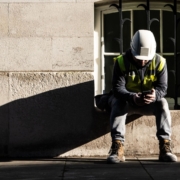Today, the electrical profession is experiencing a wealth of exciting tech innovations, new regulations, operational updates, and more. Staying informed about emerging trends empowers electrical workers and contractors to stay ahead, advancing their careers and success in the industry.
Keep your finger on the pulse of the modernization of the electrical sector in 2024 by learning more about these developing innovations.
The Top 4 Trends Reshaping the Electrical Industry
What lies ahead in the electrical and power generation field? Advancements in sustainable energy, high-tech safety solutions, and sophisticated energy delivery systems are pushing the electrical industry forward.
These four trends are expected to flourish in 2024 and establish themselves in the coming years.
1) Energy Awareness & Sustainability 
Renewable energy sources are on the minds of residential and business owners. According to recent data, one-fourth of energy will come from renewables by 2024. Plus, the Inflation Reduction Act, signed into law in 2022, encourages clean energy developers to uphold robust labor standards, ensuring workers reap the rewards of the green economy they help construct.
In the coming decade, electricians can expect promising job opportunities in fields such as Wind Turbine Technicians, projected to grow by 68%, and Solar Photovoltaic Installers, anticipated to see a 52% increase. Understanding the workings of solar and wind technologies will be crucial for contractors and workers in the electrical and construction fields.
2) Distributed Energy Resources (DERs)
Along the same vein as renewable energy awareness, DERs are on the rise. These small-scale electrical generation technologies are geared towards offering consumers more choices about their energy output and consumption. DERs help alleviate some dependence on large power plants and high-voltage transmission lines. Electrical workers trained in DER technologies gain the skills to design, install, and maintain the systems, ultimately becoming essential contributors to modernized practices.
3) Smart Homes & Cities
Remaining current with smart technology is vital for the professional development, safety, and competitiveness of electrical workers and contractors. In fact, in 2023, smart home devices are anticipated to be adopted by 46.5% of all households.
Apart from smart homes, numerous large and midsize American cities are adopting smart city initiatives, encompassing clean energy objectives and backup grid power systems. Future trends are likely to involve increased integration and connectivity between smart homes and their respective smart cities. A strong command of smart technology can unlock fresh job prospects, career avenues, and business opportunities within the ever-evolving electrical and construction sectors.
4) Innovative Safety Tech
Professionals in the electrical and construction industries prioritize safety. Today, advancements are making it easier than ever to stay safe
- Tech-driven personal protective equipment (PPE) is engineered to alert workers when they are nearing dangerous electric fields.
- Wearable devices can monitor and report crucial job-site information, including potential hazards.
- Permanent electrical safety devices can read energy output from the outside of electric cabinets and validate safe, zero electrical energy.
Comprehension of these safety innovations can help prevent on-the-job injuries and go a long way to keeping workers safe.
Stay Ahead of the Curve With Union Membership
By staying up-to-date on consumer trends and emerging technologies, you can provide cutting-edge solutions for your clients and be a competitive contender in the market.
NECA members gain access to invaluable industry resources, including best practices, technical insights, and industry standards, to stay well-informed and retain their competitive advantage.
IBEW plays a crucial role in supporting electricians’ career advancement by offering education, training, job placement assistance, and advocacy, ensuring that they have the tools and opportunities needed to thrive in the electrical industry.
Union Membership Matters: Foster Your Professional Growth
Adapting to industry changes fosters professional growth, credibility, and profits in an ever-advancing field. NECA-IBEW Local 48 knows that staying current is essential for success and is here to help you move forward as a contractor or tradesperson by staying abreast of the latest cutting-edge industry innovations.
The NECA/IBEW partnership is committed to building trust, nurturing a highly skilled workforce, and making impactful contributions to our communities. Get details about the positive impact membership can make in your professional life.



 rankings when compared to other professions in the U.S. In addition, numerous veterans are drawn to careers in construction due to their mission-driven approach. Sadly, they also confront a heightened risk of suicide, with an
rankings when compared to other professions in the U.S. In addition, numerous veterans are drawn to careers in construction due to their mission-driven approach. Sadly, they also confront a heightened risk of suicide, with an  a supportive environment. Not only will it keep our robust workforce healthy and happy, but it will also ease tensions felt by management, such as retaining a skilled labor pool.
a supportive environment. Not only will it keep our robust workforce healthy and happy, but it will also ease tensions felt by management, such as retaining a skilled labor pool.